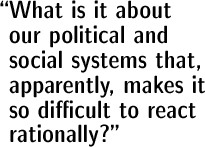A Spate of Shortsightedness
I’m concerned by what I see as a spate of shortsightedness in this country.
Here are two examples.
Toner Cartridges
Last October, apparently, a terrorist group experimented with shipping explosives in toner-cartridge packages as a way of bringing down cargo aircraft. In response, the US government, through the TSA, “restricted the transport of printer and toner cartridges.”
To me, this kind of response is like seeing someone drive up to a government building with explosives in his Chevy and reacting by making it illegal to approach government buildings in a Chevy. It misses the broader point.
Even though the toner cartridges offered certain benefits, they were not central to the malicious plan. Yet four months of government work produced an inane, short-sighted response that focused on printer and toner cartridges, rather than on the real issues.
Nuclear Power Plants
 In March, an earthquake-induced tsunami damaged the Fukushima nuclear reactors in Japan along with many of the auxiliary systems that were supposed to mitigate the impact from any potential damage. The result was partial reactor meltdowns, thousands of square miles of contaminated land, billions of dollars in damage, and as-yet unknown health consequences.
In March, an earthquake-induced tsunami damaged the Fukushima nuclear reactors in Japan along with many of the auxiliary systems that were supposed to mitigate the impact from any potential damage. The result was partial reactor meltdowns, thousands of square miles of contaminated land, billions of dollars in damage, and as-yet unknown health consequences.
In response, officials here in the US looked at the degree to which nuclear reactors can withstand earthquakes and tsunamis, variously noting that those two events are unlikely in the areas where certain reactors are built, and that other reactors can withstand any likely earthquake.
But, again, the problem isn’t earthquakes or tsunamis per se. The problem is unexpected conditions. And it only took until last month for new unexpected conditions to surface. A fire broke out in Arizona that threatened the nuclear facility in Los Alimos. And floods forced the shutdown of two other nuclear power plants across the nation. Just last week, reports were published about jellyfish blocking the intake valves of cooling systems at some nuclear power plants.
Shortsightedness
It seems to me that what these decisions — and many more like them — have in common is shortsightedness. They are instances of reacting to a specific example of a broader problem by focusing on the example instead of the problem.
By and large, high-ranking policy advisers and nuclear engineers are not stupid. Surely they can see the folly of these decisions.
So I’m left wondering. What is it about our political and social systems that, apparently, makes it so difficult to react rationally?




I find it interesting that you also in the US can be that shortsighted, especially after 9/11. Very strange.
Brilliant commentary!
Your point is actually not irrational thinking but the inability to think in abstract terms. A Japanese reactor gets hit by a tsunami, so the bureaucrats worry about a tsunami far inland in the US where it is impossible for a tsunami to occur. Applying your logic, they should have asked themselves what sorts of natural disasters could threaten nuclear reactors, which is abstract, and not whether or not a tsunami is a likely threat, which is concrete. Most people manage to avoid Piaget’s formal operational stage of cognitive development when they are young. and end up with limited or no ability to reason abstractly.
Another point is for whom do they work. The people who just can’t bring themselves to regulate Bernie Madoff and the other Wall Street fraudsters who brought about our endless depression may not be as concerned with the public good as you imagine. They may be working quite rationally, but to an end they prefer not to acknowledge.